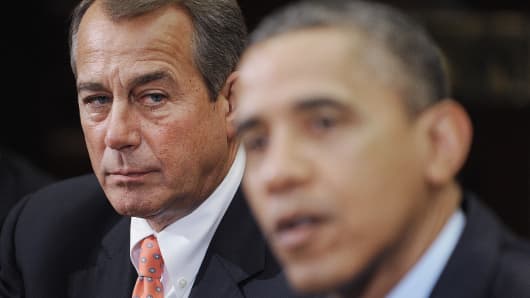And, in the meantime, U.S. corporations are parting with record amounts of cash to pay out dividends early.
Elsewhere:
1) Toll Brothers: another homerun. The high-end builders like Toll Brothers are really firing on all cylinders. Orders were up 70 percent, well above everyone's estimate. Gross margins also improved. Full-year 2013 guidance for home deliveries (a key metric) were conservative.
The U.S. housing recovery has fueled builders and building materials this year as prices for single-family homes have increased since February. "Pent-up demand, rising home prices, low interest rates, and improving consumer confidence motivated buyers to return to the housing market in FY 2012," said Toll Brothers CEO Doug Yearley.
But there's a big problem with Toll Brothers: It's really expensive. Really expensive. Trading for close to 30 times 2013 earnings. Really. That's expensive, and even though other home builders are trading in the 20s as well, Toll Brothers is at the top.
2) The bidding may be heating up for Knight Capital Group, which last week was the subject of two offers, from Virtu Financial and Getco. According to The Wall Street Journal, Cerberus may come in to join Virtu's bid for Knight.
Why does Cerberus need to step in? No one has said, but the obvious answer is that Virtu does not have the cash on hand to close the deal.
It's a lot of cash. Depending on who you talk to, it has to come up with roughly $1 billion for the company, plus another $500 million to cover debt, so it needs at least $1.5 billion, plus enough money to run the operations, so figure maybe $1.8 billion or so.
That's likely where Cerberus steps in.
Speaking of deals, how about telling us exactly how much you (Virtu) plan to offer for Knight? We still don't know exactly what Virtu is offering, only that it is above $3. This makes it pretty difficult to figure out which firm is offering a better deal.
The Getco offer has its own problems. It's far more complex: It would keep the firm public by engineering a reverse merger, combining Getco and Knight into one firm. Knight shareholders get cash, at $3.50 per share, but only for half the shares outstanding; the remainder is converted into half a share of the new Knight-Getco company.
Getco does not make its finances public, so no one has any idea what this new organization would be worth.
But assuming Virtu is offering $3 a share, the combined Knight-Getco entity would have to trade at least $2.50 a share to make the two offers roughly equivalent: 50 percent of $3.50 ($1.75), plus 50 percent of $2.50 ($1.25) equals $3 a share.
The advantage of the Virtu deal is that it is far simpler to execute. A firm, all-cash offer of $3.50 or better from Virtu might be enough to clinch the deal.
One problem for Virtu: The shareholder base. Getco owns 16 percent of the shares, Jefferies — which is backing Getco — owns roughly 24 percent. Matt Niemetz, who is on the Knight board, has already recused himself, because he was formerly with General Atlantic, a backer of Getco.
3) The dollar is down, the euro is up, and gold has broken below $1,700. What gives?
Very disappointed longs, said one trader. Only minor demand from India; China's OK. Investors coming into buy gold exchange-traded funds,
4) The Reserve Bank of Australia lowered its key interest rate to three percent, the fourth cut this year and the lowest in several years. One key reason for the cut: The Australian dollar is much stronger now than a few years ago against the U.S. dollar.


